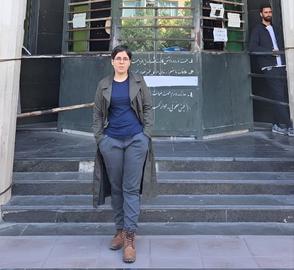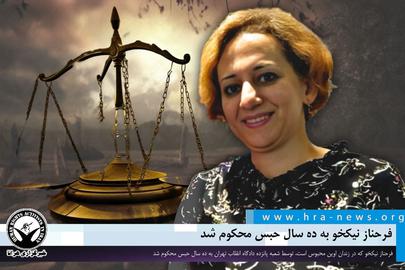Farahnaz Shiri’s name is familiar to many Iranians, a name that arouses their admiration. She was the first female bus driver in Iran. She was also the first female member of the Syndicate of Workers of Tehran and Suburbs Bus Company (SWTSBC), one the few independent labor unions that exist in Iran. Despite being subjected to pressure and harassment by the government, she has continued to engage in protests to demand that workers’ rights be respected. A number of union members are behind bars.
She joined the bus company in 2007 but, in 2010, she and 30 other female drivers were forced out of the company. She took legal action and the Court of Administrative Justice has ordered her reinstatement three times. Nevertheless, except for seven months, the bus company has refused to comply with the court’s order. Undaunted, she still continues her efforts to return to work.
Farahnaz Shiri was born in Tehran in 1967 and has two sons aged 24 and 30. By the time she was 18, she was such a skilled driver that she was hired as a driving instructor by a driving school in Tehran. Her husband was a bus driver and heavy vehicles operator, so she decided to try her luck by trying to pass the test for a first class commercial driver’s license – and she succeeded. “In 1994, a friend of ours was excavating for the project to build Sattar Khan Traditional Market,” a shopping center in Tehran, she says. “He saw me driving and told me: ‘If you want something to occupy you, come and work with our machinery.’ After I got my license, I worked there for a while, excavating and transporting loads. Then my husband and I decided to buy a bus and carry passengers in Tehran.”
Farahnaz Shiri and her husband bought the bus and started carrying passengers: “It was very interesting how people reacted. At first, everybody looked at me with surprise. Then, little by little, some women asked me how they could become bus drivers. Some officials of Tehran Bus Company saw me behind the wheel of my bus and asked me to join the company. So I sold my own bus and this was when all the troubles started.”
Farahnaz went to work for Tehran Bus Company in 2007 but, six months later, she was fired from her job because she did not have a formal contract. Since then, she has been tirelessly working to return to her job that she had accepted at the behest of directors of the company.
She says that, in 2010, the judiciary’s Dispute Resolution Council finally ruled that she must be reinstated at her job: “After this verdict, I worked for around seven months but, once again, they dismissed me. I appealed to the Court of Administrative Justice and they said that since the employer had not filed a complaint [against me] with the court, I must be returned to work and the case was closed. This time they said that I must be given a contract. Finally, the Court of Administrative Justice ruled that I must be officially hired as a worker.”
Punished for her Union Activities
It is not clear why Farahnaz Shiri’s employment is sabotaged, but she believes that the sole reason is her union activities and her membership in the Syndicate of Workers of Tehran and Suburbs Bus Company: “I am the first female driver of the bus company and was a driver until March 2010, but the company’s directors refused to renew my contract without providing a clear reason. Each time they said that my hiring was being processed until 2011 when they fired me.
“As the verdict of the Court of Administrative Justice says: ‘Considering the record of this worker and the permanent nature of her work and based on Provision 2 of Article 7 of the Labor Law, the appellant should be hired as a permanent worker and be given an appropriate job.’ This year, even the interior minister and Tehran’s mayor promised that they would get me a van to operate it myself but even this promise has not been kept. The only reason is my union activities because there are no wrongdoings or black marks in my record.”
To sum up, during these long years, the Court of Administrative Justice voted three times that Farahnaz Shiri must be reinstated but, each time, the employer refused to abide by the court’s decisions. She says that, a few years ago, the Tehran Bus Company wanted them to agree to a “forced severance pay:” “They took away our buses and refused to pay for our insurance. This caused a lot of problems for me and colleagues who were their family’s breadwinners, but I did not accept the forced severance pay.”
Farahnaz Shiri has the necessary legal permits for driving a transportation bus in Tehran and, according to the verdict of the Court of Administrative Justice, there are no legal reasons to prevent her from returning to her job: “On December 16, 2018, the Court of Administrative Justice voted to reinstate me at my job with a perpetual contract and employment, but the gentlemen do not abide by it. They don’t like my insistence on returning to work but I have no other choice.”
Farhanaz Shiri quotes an official of the Labor Department in Tehran province as telling her: “If I were the CEO of the bus company, I would know what to do with you and, since you are a trade unionist, whatever decision the Court of Administrative Justice issues, I and the provincial labor department will vote again to fire you.” They seem to have been able to carry out the treat.
The Islamic Republic’s labor law allows unions and syndicates but, throughout the years, Farahnaz Shiri and her colleagues have been denied their jobs for being union members.
Shiri’s long fight for her rights has won her the support of international labor organizations. In February 2019, the International Transport Workers' Federation called on the Islamic Republic to revoke prison sentences handed to labor activists and to return to work five members of the Syndicate of Workers of Tehran and Suburbs Bus Company, including Farahnaz Shiri.
“I am a driver but I would be happy even if they give me an office job,” she says. “In this economic situation, not having a job is horrible. Is there a higher court than the Court of Administrative Justice? It has voted in my favor but I have been running after my rights for more than 13 years.”
visit the accountability section
In this section of Iran Wire, you can contact the officials and launch your campaign for various problems


























comments